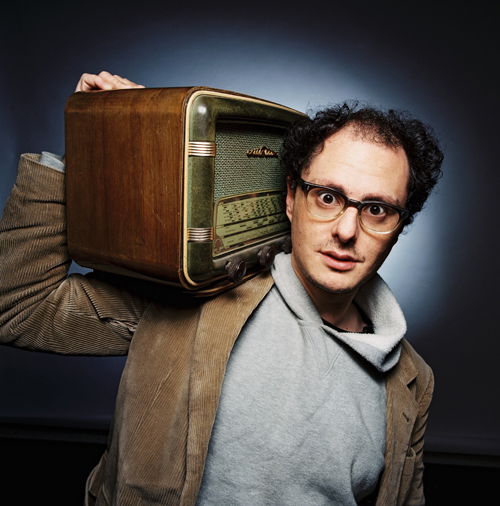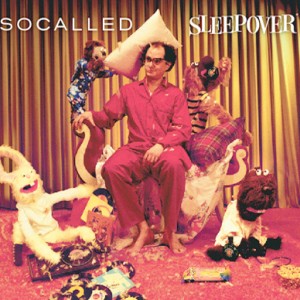Kosher Beats

An interview with Socalled
by Gregg Shapiro
Jews in hip-hop are not all that unusual. Just ask the Beastie Boys or producer Rick Rubin. But gay Canadian Jews in hip-hop are something else altogether. That’s where Socalled (aka Josh Dolgin), the self-described “Gandhi of hip-hop,” enters the picture. An accomplished musician, Socalled is also a hip-hop pioneer, drawing his samples from retro Klezmer recordings, creating a patchwork-quilt prayer shawl of pop music. Really, Socalled must be heard to be believed—on albums such as his latest, Sleepover (Dare to Care) and its predecessors, Ghettoblaster and The Socalled Seder. Backed by a stellar lineup of musicians, including Katie Moore (the Dionne Warwick to Dolgin’s Burt Bacharach), Socalled takes hip-hop to new and inspiring heights. I spoke with Socalled about his work during the summer of 2011.
Gregg Shapiro: Josh, I’d like to begin by talking about your sampling process, which you talk about in the doc The Socalled Movie. You make good use of vintage Klezmer music, part of which is from your personal record collection. Were these record albums in your family’s record collection, or did you seek them out on your own?
Socalled: Well, I grew up in this little town in Québec, just north of Ottawa. We were the only Jewish family in town. My parents were born in Canada, and they’re part of secular North American Jewish culture. They didn’t speak Yiddish. I never heard that language. I never heard about Yiddish theater. I never heard about Klezmer, per se. It was only through becoming a hip-hop producer and collector and sampler of records that I fell upon these incredible examples of this very vibrant, incredibly intricate, brilliant living tradition of Yiddish culture before the Second World War and the post-war assimilation of Jews.
 So, no, as a kid, I had no idea about Chasidic or cantorial music or Yiddish theater or so-called Klezmer—Eastern Eurpoean Jewish dance music. It was certainly not part of my family’s culture and not at all part of the popular culture. You don’t run into it on a day-to-day basis. It’s not part of the cultural landscape. It’s not like jazz, which has been embraced and developed and become other things that you can still hear today. You can still hear the masters of jazz. You can still hear Duke Ellington in Beyoncé, maybe. But nobody’s ever heard of Abe Schwartz and Dave Tarras and other masters of the art who have been swept under the carpet of history.
So, no, as a kid, I had no idea about Chasidic or cantorial music or Yiddish theater or so-called Klezmer—Eastern Eurpoean Jewish dance music. It was certainly not part of my family’s culture and not at all part of the popular culture. You don’t run into it on a day-to-day basis. It’s not part of the cultural landscape. It’s not like jazz, which has been embraced and developed and become other things that you can still hear today. You can still hear the masters of jazz. You can still hear Duke Ellington in Beyoncé, maybe. But nobody’s ever heard of Abe Schwartz and Dave Tarras and other masters of the art who have been swept under the carpet of history.
What about Mickey Katz [father of Joel Grey], Jan Peerce, or The Barry Sisters?
Jan Peerce is on The Socalled Seder CD, maybe in [the song] “Chad Gadya,” a little bit. The Barry Sisters, who used to be called The Bagelman Sisters, are here and there. I’ve used them for years. And Mickey Katz is everywhere, especially on the Tweet Tweet album which was done by this group we have called Abraham, Inc., featuring master Klezmer clarinetist David Krakauer and James Brown’s trombone player Fred Wesley. And there’s a great Mickey Katz song called “Trombonik,” which in Yiddish means a schleppy, lazy guy, and it’s also a play on words. So we did a reimagining of the song.
You make some interesting choices when it comes to cover material, such as “Slaughter on 10th Avenue” on Ghettoblaster and “Springhill Mine Disaster” on Sleepover. Why did you choose to record such a traditional rendition of Peggy Seeger’s “Springhill Mine Disaster”?
Basically because I liked it. I thought it was a beautiful song. I started performing it straight up. It was for a special event with Chilly Gonzales. He was on piano, and there was a drummer, and I just sang it in two-part harmony with Katie Moore. Sometimes if I like a song, I just want to do it straight up and down. Also, I liked that it’s Canadiana. I like to represent for that side of my personality.
And she also identifies as a member of the LGBT community.
Oh, does she? That’s very cool. One of the first people who recorded it was Theodore Bikel, who you might know. For the CD launch in Montreal he happened to be in town, so he came and sang it with us. That was pretty awesome.
You mentioned Katie Moore, Chilly Gonzales, and Fred Wesley. You have a sort of core group of musicians with whom you’ve recorded. What made you want to expand the group and work with Roxanne Shante, Sophie Trudeau, Derrick Carter, and Matt Haimovitz on Sleepover?
On Sleepover, I wanted to have fewer guests. I wanted to get the sound of what was happening live on stage on tour. That was really that core group, such as Katie, who’s the voice of Socalled. And there’s this amazing guitarist, Allen Watsky, and Dwayne Dolphin, a bass player who plays with Fred and Funkadelic. I tried to focus the sound. On Ghettoblaster, we were playing with 40 musicians—wall-of-sound insanity. I thought I wanted to make this record a little more accessible, more poppy, so I tried to limit the invitations. At the end of the day, I kept running into cool people that I always wanted to work with and finally got around to working with. One thing led to another, and before you know it we had 35 people on the record. Why did I want to work with Roxanne Shante? Because she’s so awesome. Derrick Carter, the same thing. What I realized when I was making this record is that that’s what I do. I put people together. When you put those masters together you get some interesting effects.
In the doc you say that you “hate ghettoized, exclusive communities,” but that you “love the culture that develops in protected communities.” As a gay man, would you include the LGBT community in that category?
I guess so, except that it’s a little bit different because there can be gay people in all sorts of communities already. It’s harder to be closed off in that community unless you make that your total community. I never have. It is what I am.
So would the inclusion of dance tracks and dance remixes, i.e. “Richi” on Sleepover and “Let’s Get Wet” on Ghettoblaster, be your way of reaching out to your LGBT family dancing in the clubs?
Interesting. Maybe not consciously, but certainly I know that that’s where that music comes from. And that’s where I was and that reflects where I’m from and where I’d like to be—in dance clubs. Especially if you listen to the lyrics, they’re kind of gay anthems. They’re sung by Katie Moore, but they’re written by me. So, why not? That would be awesome.
There’s a sweet scene in the doc where you mention your “cute, shy boyfriend” who is asleep in your bed during the filming. Have you ever written any songs for or about him?
Oh, God, everything! Everything on that new record is about him. “Beautiful,” “Silent Treatment.” “Richi” isn’t about him—that’s about another guy. Actually, the disc is dedicated to him. Semmie is him and Poopsie is our dog.
In the middle of the doc we learn about the doc you were working on about gay porn pioneer Toby Ross. So do you think that, as fellow gay Canadian musician Rufus Wainwright sings, that there is a gay messiah coming, “reborn from 1970s porn”?
[Laughs] I wish there was. Unfortunately, a lot of the stars from ’70s gay porn are not around to become the Messiah these days. Especially a lot of the people that Toby worked with, because they were essentially street kids and he has no idea where any of them are. I don’t know, that’s just some Rufus Wainwright shit going on there.
Do you ever foresee making and releasing music under your birth name, Josh Dolgin? If so, how would it differ from the Socalled music?
Hmmm, that’s an interesting question. I’ve been working on the music of Kurt Weill, learning lots of his Broadway material. All his American repertoire. I just want to play the piano and get amazing singers to sing it. I’ve been talking to Theodore Bikel and Feist and George Clinton about singing these brilliant Kurt Weill songs. But that would probably be Socalled, too. For the time being, I think Socalled is going to be making all the records, and Josh Dolgin will just play piano on them.
Gregg Shapiro is a regular contributor to OutSmart magazine.










